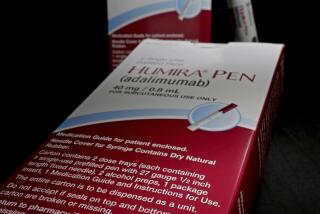Arrowhead Research seeks to reassure antsy investors
Arrowhead Research Corp. is trying to succeed where major pharmaceutical company efforts have failed in finding a cure for one of the world’s most tenacious diseases.
The Pasadena biopharmaceutical company is developing so-called RNAi therapeutics. Such treatments try to silence genes that trigger diseases resistant to conventional drugs and treatments.
The company has two drug candidates designed to combat liver disorders.
One drug, ARC-520, is early in Phase 2 Food and Drug Administration trials for the treatment of chronic hepatitis B infection. The other, ARC-AAT, is for the treatment of liver disease associated with Alpha-1 antitrypsin deficiency.
In theory, RNAi treatments can prevent proteins that drive a disease from getting on the road in the first place.
If successful, there is huge revenue potential. The Hepatitis B Foundation says that the disease is “the most common serious liver infection in the world.”
Most victims successfully fight off hepatitis B, the foundation said. But 5% to 10% of adults, 30% to 50% of children and 90% of babies who contract it will develop chronic infections.
Investors have been antsy about the Phase 1 clinical results.
“The numbers missed the mark in terms of what investors were expecting,” said Ted Tenthoff, a senior research analyst at Piper Jaffray. “That is why the stock dropped from the $13 to $17 a share range down to $5 to $6” in the last year.
Although Arrowhead is based in Southern California, more than half of its workforce and most of its research and development team is in Madison, Wis.
The company was incorporated in South Dakota in 1989 and reincorporated in Delaware in 2000 under the name InterActive Inc.
In 2004, a privately held California corporation called ARC acquired 89% of the company stock. InterActive then changed its name to Arrowhead Research Corp. The company also went public in 2004.
The latest
Arrowhead last week pushed to regain the confidence of investors, releasing early Phase 2 clinical trial results for ARC-520 and ARC-AAT.
“We presented some important advancements today for both ARC-520 and ARC-AAT,” said Christopher Anzalone, Arrowhead’s chief executive.
In October, Anzalone wrote an open letter to shareholders saying the company has always been honest about its trials data.
But several law firms have filed suit or announced that they are seeking shareholders to serve as plaintiffs in class-action lawsuits, alleging the company misled investors about the effectiveness of its treatments. A company spokesman said the firm would “vigorously defend” against the claims, calling them “without merit.”
Accomplishments
Arrowhead has some important strengths that may serve it well as it continues to pursue FDA approval, analysts say.
“This is a $300-million company [in market capitalization] with $200 million in cash,” said Ted Tenthoff, a senior research analyst at Piper Jaffray. “It is very well financed.”
Challenges
Many companies have tried and failed to develop successful RNAi therapies.
Abbott Laboratories of North Chicago, Swiss pharma giant Hoffmann-La Roche, Merck & Co. of New Jersey and Pfizer Inc. of New York are among the biggest companies that have dropped RNAi development efforts in the last decade.
That might be why Arrowhead has been so volatile this year.
Shares fell from a high of $26.59 in March to $9.79 in May. After recovering to $16.96 by September, the stock fell to $5.88 last month. The stock closed Friday at $6.04.
Analysts
Four of six Wall Street analysts covering Arrowhead rated the company’s stock as a strong buy opportunity. Two suggested holding it.
Tenthoff said Thursday that he has rated the stock overweight, meaning that he expects it to give shareholders an above-industry-average return over the next several months.
Twitter: @RonWLATimes







